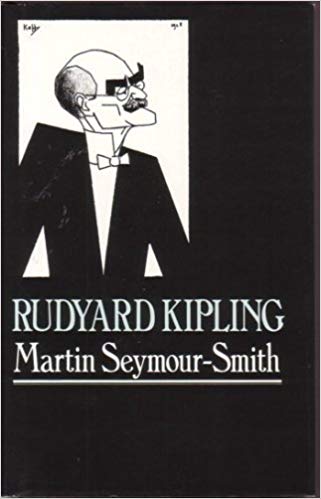Kipling should be a fascinating subject for literary history. He was enormously gifted and successful, the child of a modest, nonconformist Anglo-Scot family that, besides producing him, also produced his cousin, the conservative prime minister Stanley Baldwin. One of his aunts married Edward Burne-Jones; another married Sir James Baldwin, chairman of the Great Western Railway, and a third married E.J. Poynter, a distinguished Victorian artist who became director of the National Gallery and president of the Royal Academy. Swinburne and the Rossettis were at Kipling’s parents’ wedding reception. What social quirk could have caused this run of family successes? Kipling himself became the first really important English writer to work in a context wider than that provided by England itself He was born in India, where he spent his first two years; grew up in England, and then began his career by returning to India; went back to England, married an American, and lived in America; finally returned to England again, and ended life as a Sussex man. The result, as T.S. Eliot said, was “a peculiar detachment and remoteness from all environment,” the source of the strange, sometimes visionary objectivity of his best writing. And of course Kipling wrote at a fascinating time in English history, the decades of imperial self-consciousness to which he was laureate, critic, and analyst.
None of this interests Martin Seymour-Smith very much. He is a man with a thesis which, insofar as I can follow it, goes like this: Kipling began life like all bright boys as a good liberal with normal homosexual proclivities, offset in his case by a strong impulse to impose himself upon others. On coming to man’s estate and discovering his sexual tendencies, he recoiled into out-and-out imperialism and authoritarianism. He did, however, have one satisfactory love affair, with an American literary entrepreneur from Vermont called Wolcott Balestier, a man with very beautiful ears, “enormous innocent ears,” says Seymour-Smith: “The winglike ears add to his delicacy, and must have excited women and others who could love men.” Wolcott then died, and Kipling married his unattractive sister because she knew his guilty secret. And that would have been that, except that Kipling was also a genius possessed by a daimon that kept the flame of liberal and humane truth alive in him whether he liked it or not, and drew impeccably truthful, liberal, and proto-modernist work out of him much as a fine pianist might speak through a Bosendorfer.
When Edmund Wilson, a socialist who loathed England and the middle classes about equally, said that Dickens was a divided personality driven by unacknowledged fantasies of rage and despair, this proposition, however fantastic, was at least original and had some shock value. By now it is a cliche applicable to anyone. Seymour-Smith does his best in a combative foreword to this first American edition of his book to present himself as an homme sérieux, shocker of prudes, neoimperialists, Kiplingites, conservatives, and “the tabloid-minded,” but he has written a dull book in banal, clumsy English: not so much a life of Kipling as a muddled contribution to a running argument that has been going on far too long back there in the twilight empire. An American reader simply does not know what Seymour-Smith is talking about when he says that Kipling’s politics were hooliganism, or that “Imperialism, of all the political crazes that have arisen in the past century and a half, is the most nakedly egocentric and subjective.” On the face of it, those remarks—and others like them—don’t make much sense. One longs for facts and explanations. As for Kipling’s latent homosexuality, it is the book’s King Charles’ head, always turning up in its predictable, arbitrary way. Given the pop-psychology of our times, Kipling—unhandy, pudgy, unathletic, shortsighted, and certainly no beauty—is a sitting duck for this kind of hypothesizing, but no evidence is provided for it. In fact this whole book is written on a bibliography of 13 items, and there are no references—not even when the author tells us that Winston Churchill slept with the English film star and musical comedy composer Ivor Novello (composer of “Keep the Home Fires Burning”), and found it a musical experience.
For whom then is the book written? On the evidence of its content it is for readers who have little grasp of the principles of evidence, proof, and judgment, and who are uninterested in detail and reality. They know very little about the literature, art, and music of Kipling’s time. They are suspicious of authority. They distrust anything conservative, and although they can afford $23 for this book, they take it for granted that the working classes are the natural superiors of the middles and the uppers. They have a taste for agnostic but daffy aphorisms, e.g., “Achievement rarely stems, initially, from virtue; it usually stems from vice,” or “A person with a sense of duty, however narrow and hateful that sense may be, is sometimes preferable to one without one.” They enjoy seeing T.S. Eliot called a right-wing extremist, and they get a little thrill out of hearing the old pre-1914 British army called “mercenary” instead of “professional.” In other words, they are thoroughly conventional in a way Kipling was not. It is unlikely that they will go on to read Kipling himself, but they would probably enjoy seeing this book turned into a series for public television or made the subject of an interview by Bill Moyers. And perhaps that is what the publisher is counting on.
[Rudyard Kipling, by Martin Seymour-Smith (New York: St. Martin’s Press) 375 pp., $22.95]

Leave a Reply